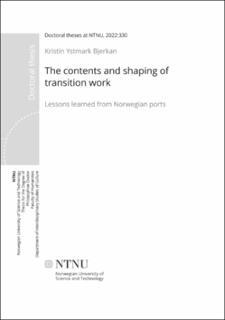The contents and shaping of transition work: Lessons learned from Norwegian ports
Doctoral thesis
Permanent lenke
https://hdl.handle.net/11250/3028805Utgivelsesdato
2022Metadata
Vis full innførselSamlinger
Sammendrag
Sammendrag
For å motvirke stadig mer synlige effekter av klimaendring tvinges vi til å revurdere måtene samfunnet er organisert på. Et fremtidig lavutslippssamfunn fordrer at beslutningstakere ikke bare fokuserer på teknologisk innovasjon og mangfold, men at de også stimulerer ikke-teknologiske endringsprosesser. Videre er det stadig tydeligere at bærekraftig omstilling foregår i skjæringspunktet mellom ulike teknologier og ulike sektorer. Dermed kan havner, som er plassert mellom ulike aktører, sektorer og markeder, spille en nøkkelrolle i omstillingen til et bærekraftig samfunn.
Denne avhandlingen skal derfor imøtekomme behovet for kunnskap og forståelse av hvordan havner kan drive frem bærekraftig omstilling. Den beskriver hva omstillingsarbeid i tre norske havner inneholder og skapes av. Omstillingsarbeid forstås her som alle former for villede og målrettede aktiviteter som skal fremme bærekraftig omstilling. Dette er basert på forståelser av sosioteknisk stabilitet og endring som beskrives innen teknologi- og vitenskapsstudier (STS) og i forskning på bærekraftig omstilling. I avhandlingen foreslås en konseptualisering av omstillingsarbeid som skal bidra til aktive fortellinger om hvordan aktører agerer, som vektlegger omstillingsarbeid som retningsgivende, som lar seg operasjonalisere empirisk, og som gir en tydelig definisjon på omstillingsarbeid.
Denne konseptualiseringen er benyttet i diskusjoner av omstillingsarbeid i Narvik havn, Kristiansand havn og Oslo havn. Med utgangspunkt i empiriske undersøkelser i disse havnene foreslås et konseptuelt rammeverk for omstillingsarbeid som skiller mellom seks former for omstillingsarbeid: teknologisk arbeid, visjonsarbeid, styringsarbeid, politisk arbeid, reflekterende arbeid og relasjonsarbeid. Denne inndelingen skal bidra til å sammenstille de mange ulike aspektene ved omstillingsarbeid, og inndelingen representerer én tilnærming til å systematisere aktiviteter som kan fremme bærekraftig omstilling.
Denne avhandlingen diskuterer videre hvordan ulike former for omstillingsarbeid kan oppstå. Dette kan skje innenfor såkalte sosiotekniske konfigurasjoner, som reflekterer omstillingsdynamikken som beskrives i flernivåperspektiver på omstilling. Avhandlingen gir derfor eksempler på hvordan omstillingsarbeid kan formes av de unike sosiotekniske systemene som havner er en del av, hvordan aktører og teknologier kan styre og påvirke omstillingsarbeid, hvordan ytre press påvirker behovet for og omfanget av omstillingsarbeid, og hvordan normative forventninger til havner oppfordrer dem til å agere som mellomromsaktører.
Fordi de kan tilrettelegge omstilling på tvers av sektorer og systemer kan havner spille en betydelig rolle i bærekraftig omstilling av samfunnet. Dette krever imidlertid at havnene selv og politiske beslutningstakere anerkjenner det potensialet som havnesektoren har for å drive transformativt omstillingsarbeid, og at dette arbeidet oppmuntres gjennom mandater og virkemiddelbruk.
Summary
To counter the increasingly visible effects of climate change, societies are forced to rethink the ways in which they function. To accelerate towards net zero emissions, policymakers should not only focus on technological innovation and technological diversity, but also stimulate non-technological change processes. Further, it is increasingly clear that societal transformations occur at the intersections of many different technologies and many different sectors. Thus, ports, which are located amidst many actors, sectors, and markets, could play a key role in societal transformation.
This thesis therefore addresses the need for knowledge and understanding of the ways in which ports can drive sustainability transitions. To do so, it turns to the content and shaping of transition work in three Norwegian ports. Transition work is here understood as all forms of deliberate and purposeful activities aiming to progress sustainability transitions. This understanding is based on perspectives on socio-technical stability and change expressed in the field of sustainability transitions and its theoretical lineage within science and technology studies (STS). I propose a conceptualization of transition work that I believe contributes to active narratives around applied agency, induces directionality onto agency in studies of sustainability transitions, provides empirically applicable constructs, and lead to explicit definitions of transition work.
This conceptualization of transition work has been applied to investigate the transition work of the Port of Narvik, the Port of Kristiansand, and the Port of Oslo. This investigation encouraged a conceptual framework for transition work that distinguishes between six types of such work: technological work, visionary work, governance and policy work, political work, reflexive work, and relational work. These groups serve to simplify the many facets of transition work and provide one way of collecting and gathering different activities that are dedicated to progress transition.
This thesis has further studied how different types of transition work emerge. Specifically, it has discussed ways in which transition work emerges within socio-technical configurations, which reflect transition dynamics typically expressed in the multi-level perspective (MLP). These discussions provide examples of the ways transition work is shaped by the unique socio-technical systems of which ports are part, the ways actors and technologies direct and influence transition work, they ways that landscape pressure contest rationalities and determine the need and scope for transition work, and the ways normative expectations of ports urge them to take on roles as intermediaries.
As particularly potent sites for deep transition and whole-system transformations, ports could play a cardinal role in society's quest for sustainable futures. However, this calls for ports and policy alike to recognize the potential transformative effect of the transition work of ports and the need to encourage such work through transformative policy mixes.
Består av
Paper 1: Bjerkan, Kristin Ystmark; Ryghaug, Marianne; Skjølsvold, Tomas Moe. Actors in energy transitions. Transformative potentials at the intersection between Norwegian port and transport systems. Energy Research & Social Science 2021 ;Volum 72. https://doi.org/10.1016/j.erss.2020.101868 This is an open access article under the CC BY license (http://creativecommons.org/licenses/by/4.0/).Paper 2: Bjerkan, Kristin Ystmark; Ryghaug, Marianne. Diverging pathways to port sustainability: How social processes shape and direct transition work. Technological Forecasting and Social Change 2021 ;Volum 166. s. 1-11 https://doi.org/10.1016/j.techfore.2021.120595 This is an open access article under the CC BY license (http://creativecommons.org/licenses/by/4.0/).
Paper 3: Bjerkan, Kristin Ystmark; Seter, Hanne. Policy and politics in energy transitions. A case study on shore power in Oslo. Energy Policy 2021 ;Volum 153. https://doi.org/10.1016/j.enpol.2021.112259 This is an open access article under the CC BY license (http://creativecommons.org/licenses/by/4.0/).
